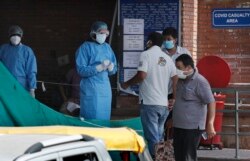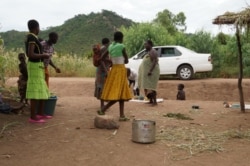A European pharmaceutical giant reached agreement Saturday with an alliance of European countries to supply those nations with up to 400 million doses of an experimental COVID-19 vaccine.
AstraZeneca struck a deal with the Inclusive Vaccines Alliance, established by France, Germany, Italy and the Netherlands, to accelerate production of a vaccine being tested by the University of Oxford that may be available by year’s end.
Saturday’s agreement aims to make the vaccine available to other European countries that wish to participate in the initiative.
AstraZeneca previously reached similar deals with Britain, the Serum Institute of India, the U.S., the coalition of Epidemic Preparedness Innovations, and Gavi, the Vaccine Alliance.
In other developments:
— Officials are warning that elderly people in the large refugee camps in Sudan’s Darfur region are getting sick and dying at surprisingly high rates. Medical officials and humanitarian workers believe the coronavirus is spreading rapidly and untracked among the country’s most marginalized people.
There are few medical facilities near the camps in the war-torn western region of Sudan, to which 1.6 million people fled during years of conflict.
— India reported its largest surge in new COVID-19 cases in a 24-hour period Saturday. The 11,458 new infections surpassed the previous record of 10,956 cases reported Friday.
The surge comes as India has reopened stores, shopping malls, manufacturing plants and places of worship. The country’s two-month lockdown that began in March has been eased, with restrictions remaining largely intact in high-risk areas.
India’s record surge of new cases propelled the massive South Asian nation to fourth place worldwide in the total number of coronavirus cases, surpassed only by the U.S., Brazil and Russia.
— China’s National Health Commission reported 11 new cases Saturday. The agency said five of the new infections were detected in people who had traveled overseas, while the remaining six were locally transmitted in Beijing. The coronavirus first emerged in China late last year.
— Health systems around the world have been drained by the COVID-19 pandemic, leaving few resources for anything else.
As a result, World Health Organization Director General Dr. Tedros Adhanom Ghebreyesus said Friday, women may face a “heightened risk of dying from complications of pregnancy and childbirth.”
Dr. Natalia Kanem, executive director of the U.N. Population Fund, said, “Even before the emergence of COVID-19, for millions of women, timely, high-quality maternal health care was unavailable, it was inaccessible, or it was not affordable. And now, with the pandemic, we're seeing exacerbation of already limited access to care, putting women's health and lives at risk."
The agency is encouraging new mothers, however, to nurse their babies. “So far, we have not been able to detect live virus in breast milk,” said Dr. Anshu Banerjee, director for WHO’s Department of Maternal, Newborn, Child, Adolescent Health and Ageing.
— U.S. President Donald Trump delivered the commencement address at the West Point Military Academy on Saturday. The graduation ceremonies were held on the academy’s parade grounds instead of the football stadium so cadets could be seated six feet apart, in keeping with COVID-19 distancing guidelines. Family and friends were not allowed to attend.
— A major study forecast millions sinking into extreme poverty because of the coronavirus pandemic.
The report by the United Nations University said the economic fallout could plunge 395 million people into conditions in which they are forced to live on $1.90 a day or less — the definition of extreme poverty.
A separate World Bank report this week put that number between 70 million and 100 million people.
“The outlook for the world’s poorest looks grim unless governments do more and do it quickly and make up the daily loss of income the poor face,” one of the U.N. report’s authors, Andy Sumner, said. “The result is progress on poverty reduction could be set back 20 to 30 years and making the U.N. goal of ending poverty look like a pipe dream.”
The U.N. report said South Asia — India, in particular — would see the largest number of people sinking into extreme poverty, followed by sub-Saharan Africa.
Experts are appealing to economically powerful nations, such as the United States, to forgive the debts of developing countries that take a strong hit from the pandemic.







